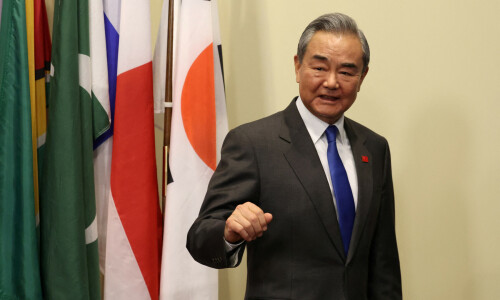THE collapse in exports to Afghanistan is an unnecessary and self-inflicted wound. The news that Pakistani exports in the current financial year may be in the region of $1bn, a drop of nearly a third, and down from a high of $2.4bn in 2011, is unsurprising. Pakistani exports have been declining for several years. But the reasons for this trend of fewer exports to Afghanistan are unique — a near collapse in ties with Afghanistan and several border closures. The closures were particularly ill-advised as the decline in the export of perishable goods hurt growers and small businesses in this country as well as in Afghanistan. A disruption in the trade of perishable goods such as fruit and vegetables causes immediate harm and the losses cannot easily be made up by growers and traders.
A decline in trade has more pernicious effects than simply hurting local economies. It loosens the ties that are vital to sustaining a close relationship that regional countries, and none more so than Afghanistan and Pakistan, should have. That in turn makes it harder to have the kind of trust and cooperation to address problems that may develop between neighbours — and few countries have the kind of need to cooperate like Afghanistan and Pakistan. The trade setback has coincided with what is arguably a humanitarian crisis as Afghan refugees in Pakistan continue to face pressure to go back. The pace of return may have slowed in recent months as Afghanistan has struggled to provide resettlement resources that the returning refugees have been promised, and Pakistan has pulled back from some of the harshest tactics that were prompting refugees to go back. Nevertheless, the decline in Pakistani exports combined with continuing demands that Pakistan-based refugees return to Afghanistan has deepened the climate of mistrust and suspicion at the people-to-people level.
Clearly, Pakistan is not the only side making poor choices. On the matter of trade, the refusal by Kabul to engage Pakistan in trade-related discussions in recent times is egregious and self-defeating. Afghanistan may be trying to communicate its displeasure at the state of overall ties, but trade is a long-term issue that should be separated from political and security tensions. What, after all, do`es Afghanistan gain by giving Pakistan the cold shoulder on trade dialogue? Consider also that with the revival of the Quadrilateral Coordination Group, and renewed efforts to open dialogue with the Afghan Taliban, Pak-Afghan ties could witness an upswing soon. Short-term thinking should be eschewed in a long-term relationship.
Published in Dawn, June 19th, 2017











































